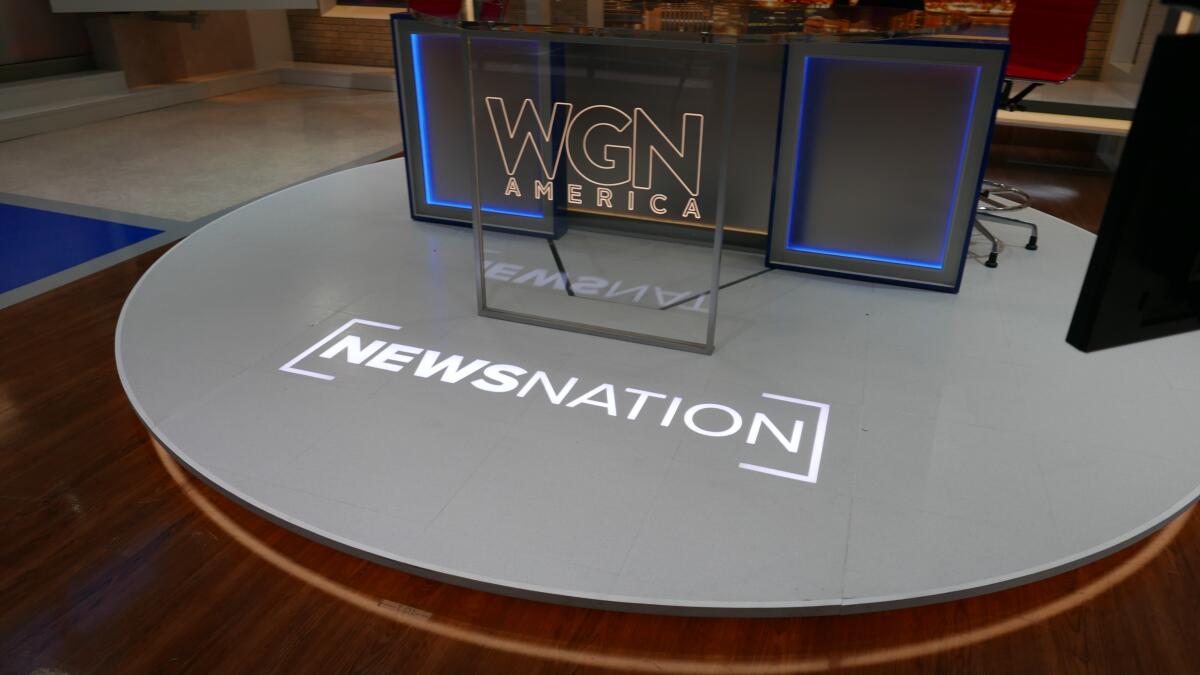WGN America’s ‘NewsNation’ looks for viewers who want their news served up opinion-free
CHICAGO — When entrepreneur Ted Turner first launched CNN in the early 1980s without any big name anchors, one of his credos was that the news would be the star of his then-revolutionary new network.
But cable news has evolved in recent years to offer up a steady diet of personalities, politics and points of view. Those elements have driven up the audiences for Fox News, MSNBC and CNN to record levels at a time when other TV networks are struggling to hold onto viewers gravitating to streaming services for their favorite dramas, sitcoms and movies.
Nexstar Media Group, the Irving, Texas-based TV station owner which acquired cable network WGN America as part of its 2019 purchase of Tribune Media, believes the shift to more talk and opinion on cable news has created an opportunity.
On Tuesday, the company will launch “NewsNation,” a nightly three-hour national prime time newscast (8 p.m. Eastern and 5 p.m. Pacific) that promises a neutral, opinion-free presentation of the day’s events, on WGN America.
If successful, Nexstar could expand the format into additional hours and over time turn WGN America, which now airs sitcom and drama reruns, into a serious cable news competitor. Like nearly every other entertainment cable channel, WGN America is losing viewers to streaming services and cord-cutting, and live news offers a chance at reinvention.
Sean Compton, executive vice president for WGN America, said the company has done extensive research that determined there is an appetite for straight-ahead TV news in the evening as an alternative to opinion hosts such as Fox News star Sean Hannity and CNN’s Don Lemon.
“Sean Hannity is not news,” said Compton. “He’s a friend of mine. I worked with him in radio for years. He’d get mad at me for saying that, but it’s true. Tucker Carlson and Don Lemon — that’s not news.”
Nexstar executives insist their promise of a politically neutral newscast is more than a marketing gimmick. Among the 150 people hired for the Chicago-based program (a process Jennifer Lyons, vice president of news for WGN America, described as “speed dating on Zoom”) are two producers dedicated to scrutinizing every story for language that could be construed as biased.
A team of rhetoricians — made up of media consultants and academics — have also been lined up to monitor the fairness of its coverage. Each night they will deliver a report on how the program fared to Lyons’ desk.
Rob Nelson, a “NewsNation” anchor hired from New York TV station WABC, is aware that positioning the program as an unbiased option will put it under a microscope.
Advertisers distance themselves from “Tucker Carlson Tonight” after the host suggested Kyle Rittenhouse’s alleged actions were a response to law enforcement failure.
“It’s a different level of scrutiny and quite honestly in the era we’re living in right now, saying ‘NewsNation’ is balanced is putting a big target on our backs and people will be looking for anything that suggests otherwise,” Nelson said as he prepared for rehearsal before the launch. “So we have no choice but to get it right because we will be called out by one side or the other very quickly if we don’t.”
Anchors and reporters have gone through sessions where their work is analyzed in the run-up to the program’s premiere.
Joe Donlon, a “NewsNation” anchor who came from Nexstar’s local Chicago station, said there have been debates with producers over the language used in some of the pieces he has written for the rehearsal programs. But he has been willing to adapt.
“I’m not above someone looking at my work and saying ‘I think it would be better with this,’” Donlon said.
Even without the challenge of enforcing a high standard of journalistic neutrality, launching a new national news operation is a risky and expensive venture.
Nexstar won’t be starting from scratch.

The company’s 185 TV stations with 5,400 employees in their local newsrooms will supply much of the reporting from around the country for “News Nation.” The program will have a bureau and a dedicated West Coast correspondent, Nancy Loo, working out of Nexstar’s Los Angeles station KTLA. Reuters will supply international coverage.
The three weekday anchors — Nelson, Donlon and Marni Hughes along with meteorologist Albert Ramon — are from local news outlets and did not command the large salaries it would have taken to attract established network news personalities.
The approach helped keep the cost of the “NewsNation” launch to around $20 million, executives said. Nexstar local stations, which cover 63% of the country, will use their air time to provide the bulk of promotional time for the program, valued at more than $100 million.
The company said it will offset most of the start-up costs by not renewing deals for several of the entertainment shows carried on WGN America, which reaches 75 million cable and satellite homes in the U.S.
Compton said having anchors without a national profile means “NewsNation” viewers will not have any preconceived notions based on their past places of employment. The only on-air journalists with network experience are Nelson, who once anchored ABC’s overnight newscast, and newly hired veteran correspondent Dean Reynolds, who departed CBS News’ Chicago bureau after a recent round of cutbacks (WGN America recruited him through his LinkedIn account shortly after he was let go).
Even the studio location for “NewsNation” will separate it from the competition. Instead of being based in the glitzy media hubs of New York and Washington, the program will air from the headquarters of Nexstar TV station WGN-TV, located in a 59-year-old utilitarian white brick building on Chicago’s North Side where the channel’s Bozo the Clown children’s show was taped for decades.
One floor above the main studio is a spacious newsroom built for “NewsNation” where socially-distanced producers are stationed by the region of the country they are covering.
Compton said the stories from Nexstar’s local stations for “NewsNation” will be presented in a way that connects to a national audience.
“You’re not going to see the ‘pet of the week’ from Indianapolis,” he said.
Compton noted that when a story occurs such as the college football season at Texas Tech being in jeopardy due to the pandemic, “News Nation” can go to the Nexstar station in Lubbock, Texas, for a live report that illustrates the challenges the public health crisis still presents throughout the country.
“We’re really working a new muscle,” said Hughes, who worked as an anchor in Seattle before joining WGN America. “In local news we take national news and localize it to make our community care about it. Now we’re doing the opposite.”
On election night, “NewsNation” will have journalists from Nexstar stations in most of the key swing states when the returns for the 2020 presidential race come in. The program will expand beyond three hours that night and on other occasions when there are breaking stories.
For Nexstar, “NewsNation” is also a chance to adapt to the changing TV landscape.
As viewing of scripted TV shows continues to shift online, live television is the best way to reach viewers with commercial messages. Nexstar Chief Executive Perry Sook told financial analysts earlier this month that WGN America is already selling advertising for “NewsNation” at a higher rate than the programming it’s replacing.
The company has not revealed its ratings goals for “NewsNation,” but people familiar with the discussions said WGN America is looking to average 100,000 viewers a night in the 25 to 54 age group advertisers want to reach with news programming.
The figure is about 25% of what CNN averaged in prime time during the month of July. The program will also air on weekends and have an app and website updated 24 hours a day.
News ranks right behind sports as the key reason consumers keep their pay TV subscriptions. Nexstar said ratings for news on its local stations has surged this year due to the pandemic, even increasing among the 18 to 34 age group that has turned away from traditional TV.
But established news viewing habits are hard to break. Mark Whitaker, a veteran journalist who has held top executive posts at CNN and MSNBC, knows that from experience.
“It really helps that a chunk of your viewership wakes up in the morning and turns you on and leaves you on all day,” he said. “MSNBC has that and so does Fox News.”
Whitaker recalled how CNN ratings fluctuated wildly based on the intensity of the news environment during his tenure from 2011 to 2013. A key reason executives who succeeded him added documentary-style series programming and opinionated personalities in prime time was to create a more reliable audience.
MSNBC was adrift as a cable news competitor until it was “consciously a channel for liberals,” Whitaker noted. Fox News was defined clearly from its start as a conservative counterweight to viewers who saw established news sources as too liberal.
Whitaker said the question Nexstar will face is whether viewers who want a straight-ahead newscast will become as “addicted” as those who regularly tune into CNN, MSNBC and Fox News.
Some who do not watch cable news may be satisfied with the down-the-middle presentations of “PBS NewsHour” or the half-hour evening newscasts on ABC, CBS and NBC, which collectively still average more than 20 million viewers a night.
“I would say there is an audience that says they are underserved,” Whitaker said. “The question is do they want something like ‘NewsNation’ enough that they would watch it day after day and hour after hour the way they do the existing channels. People love Rachel Maddow no matter what’s going on.”
“NewsNation” is likely to get noticed by a heavy news viewer in the White House.
Compton produced a regular nationally syndicated radio commentary segment for President Trump from 2004 to 2008 during his years on NBC’s “The Apprentice.” He remains friendly with Trump and noted that the TV savvy commander-in-chief is already aware of the new Nexstar venture.
“I haven’t made a big deal about it when I’ve talked to him because he’s probably not going to like it every night,” Compton said.
More to Read
Inside the business of entertainment
The Wide Shot brings you news, analysis and insights on everything from streaming wars to production — and what it all means for the future.
You may occasionally receive promotional content from the Los Angeles Times.












